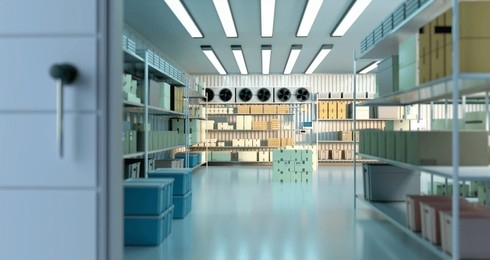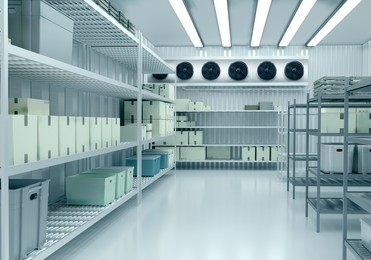When it comes to preserving perishables, the right cold storage in Denver can make all the difference.
Whether you’re a business owner looking to store large quantities of produce or a small-scale user in need of efficient space management, understanding the different types of cold storage is key.
In this comprehensive guide, we’ll explore the different types of cold storage options available, each designed to cater to specific needs and ensure your items remain fresh and intact.
What is Cold Storage?
Cold storage in Denver is a term used to describe a system or a place where goods, particularly perishable items, are stored at low temperatures to maintain their quality and extend their shelf life.
This method is critical in numerous industries, including food and beverage, pharmaceutical, agricultural, and chemical sectors. Cold storage facilities range from large warehouses to small coolers, and they play a pivotal role in the supply chain by ensuring products stay fresh from the point of production to the end consumer.

How Does Cold Storage Work?
At its core, cold storage works by maintaining a consistent, low-temperature environment that slows down the biological and chemical processes that lead to product degradation. This is achieved through refrigeration systems that remove heat from the storage area.
These systems typically involve a refrigerant, which absorbs heat and circulates through a compressor, condenser, and evaporator to regulate temperature. Advanced cold storage units also incorporate humidity control, air filtration, and precise temperature monitoring systems to create the ideal storage conditions for different products.
Types of Cold Storage
1. Walk-In Coolers and Freezers
Walk-in coolers and freezers are the backbone of many restaurants, supermarkets, and food processing industries. They offer ample space, customizable shelving, and precise temperature control. Ideal for storing large quantities of perishable goods, these units can be configured to specific dimensions and temperatures, making them a versatile choice for various business needs.
2. Blast Freezers and Chillers
Blast freezers and chillers are designed for rapid cooling and freezing. They’re essential in the food industry, particularly for preserving the quality and safety of products like seafood, meat, and ready-to-eat meals. By rapidly bringing down the temperature, these units lock in freshness and prevent bacterial growth, ensuring a longer shelf life for products.
3. Pharmaceutical Grade Cold Storage
Pharmaceutical-grade cold storage units are designed to meet stringent regulations and standards. They are crucial for storing sensitive medical and pharmaceutical products, which require consistent and exact temperatures. These units often come with advanced features like digital temperature logs and alarms to ensure the integrity of stored items.
4. Portable Cold Storage
Portable cold storage solutions, such as refrigerated containers and trailers, offer flexibility and mobility. They are ideal for temporary or mobile operations like outdoor events, catering, or as additional storage during peak seasons. These units can be easily transported and set up, providing convenient cold storage whenever and wherever needed.
5. Cryogenic Storage
For ultra-low temperature requirements, cryogenic storage is the solution. Utilizing liquid nitrogen or carbon dioxide, these storage units can maintain temperatures as low as -150°C. They are essential for preserving biological samples, certain chemicals, and pharmaceuticals that require extreme cold to remain stable.
6. Automated Cold Storage
As technology advances, automated cold storage systems are becoming more prevalent. These systems use robotics and automation to improve efficiency and reduce labor costs. They’re especially beneficial in large-scale operations, offering precise control over inventory management and reducing human error.
Why Do I Need Cold Storage?
Here’s a breakdown of its general benefits:
- Extended Shelf Life: Cold storage significantly slows down the deterioration process of perishable items. By maintaining a consistent, low-temperature environment, it extends the shelf life of foods, pharmaceuticals, and other perishable goods, allowing for longer storage and reduced waste.
- Quality Preservation: Beyond just keeping products cold, cold storage helps maintain the overall quality, including taste, texture, and nutritional value for food items, and potency and efficacy for pharmaceuticals. This is crucial for consumer satisfaction and safety.
- Regulatory Compliance: For many businesses, cold storage is not just a matter of quality but also of compliance. Strict regulations often govern the storage conditions of food, pharmaceuticals, and certain chemicals.
Cold storage solutions ensure that these regulations are met, thus avoiding legal and safety repercussions.
- Reduced Waste and Increased Efficiency: By extending the life of perishable goods, cold storage reduces waste. This efficiency is not only beneficial for the environment but also economically advantageous for businesses, as it reduces the costs associated with spoiled goods.
Conclusion
Choosing the right cold storage solution is crucial for maintaining the quality and longevity of perishable goods. From walk-in coolers to cryogenic storage, each type offers unique benefits tailored to specific needs.
For businesses looking for reliable and efficient cold storage in Denver, Mile High Delivery & Cold Storage stands out as a premier provider. With a range of options and a commitment to quality service, we are your go-to partner for all your cold storage needs.
Reach out to us to find out how we can help you preserve quality and streamline your operations!

